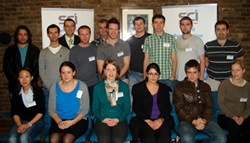This item first appeared in 2007
The 25th Process Development Symposium organised by SCI’s Fine Chemicals Group, was held at Churchill College, Cambridge on 5-7 December 2007
Process development continues to be a challenging and important area for research into, and the application of modern synthetic organic chemistry, as well as enabling technologies. This annual symposium aims to bring together a wide range of speakers from across the pharmaceutical, agrochemical and fine chemical industries, as well as those with an academic background.
The plenary speakers at the conference were Professor Steven Ley from the University of Cambridge and Dr Edward Grabowski, formerly of Merck USA. Both speakers gave their personal perspectives on how the area has changed over the last quarter of a century and how some of the challenges of the future will be met. Professor Ley also gave an overview of his recent research in flow chemistry and Dr Grabowski presented a case study on the chemical development of MK-524 – an investigational therapy for lipid/cholesterol management.
At the conference, Professor Nicholas Turner from the University of Manchester, received the GlaxoSmithKline, AstraZeneca, Pfizer Prize for Process Chemistry Research for 2007, and gave a lecture explaining his contributions to recent advances in biocatalysis, as applied to organic synthesis.
The conference was supported by a strong line up of speakers, outlining case studies from across the industry and describing recent advances in technology. A notable contribution came from Dr Paul Lobben (Bristol-Myers Squibb, USA) who in his case study on the process development of Brivanib Alaninate (a novel therapeutic in oncology) covered work in the fields of ‘process analytical technology’ and ‘quality by design’, currently hot topics with the US regulatory agency. Additionally, Dr Andy Wells from AstraZeneca and co-chair of the American Chemical Society Green Chemistry Institute Pharmaceutical Roundtable gave his thoughts on another hot topic: ‘Green chemistry and sustainable development in the pharmaceutical industry’.
A session within the programme was devoted to a retrospective of process development, ommemorating the work performed on cimetidine, atenolol and amlodipine, early blockbusters that changed the pharmaceutical industry.
The special silver anniversary social programme offered delegates an opportunity to make new contacts and meet old friends in a relaxed and informal environment. At the conference gala dinner, Professor Steven Ley received the 2007 SCI Innovation Award. The award recognises Professor Ley’s many contributions to science and technology and was presented by the well-known science writer Dr John Emsley, recipient of the 2006 SCI Communication Award.

Eighteen lectures over three days, delegates from across Europe, invited speakers from North America and an attendance close on 200, plus strong support from exhibitors – are these the attributes of a mature subject in decline? Clearly not; process development is a vibrant discipline, flourishing in both industry and academia, and the symposium organisers are looking forward to the next 25 years with optimism.
